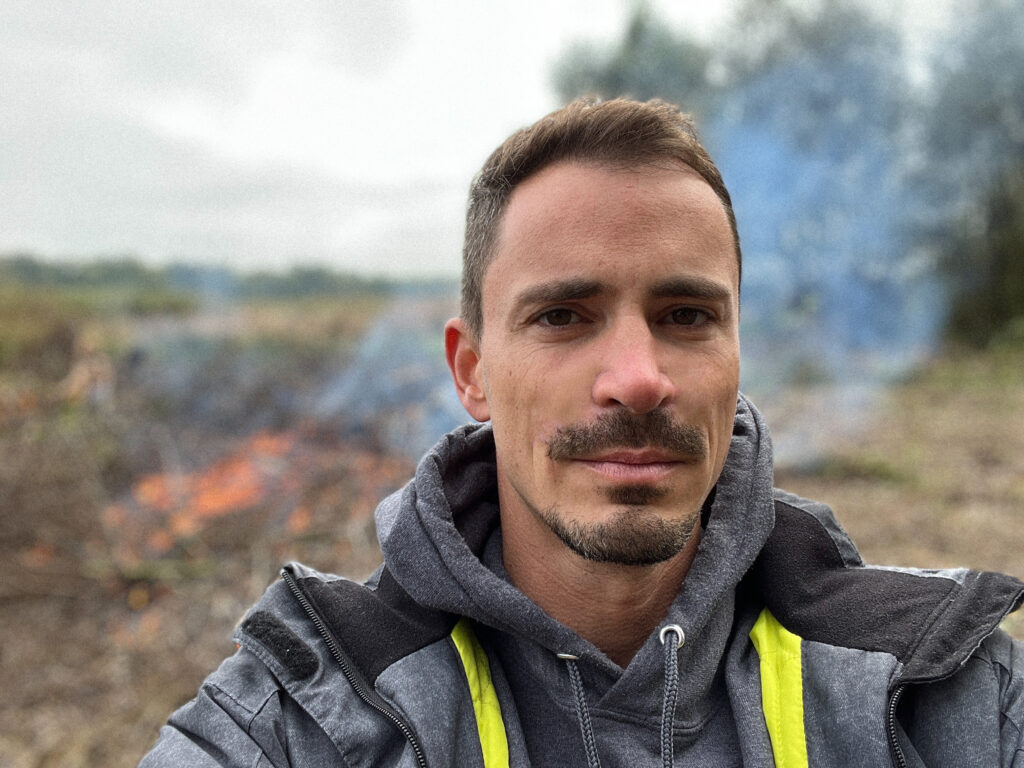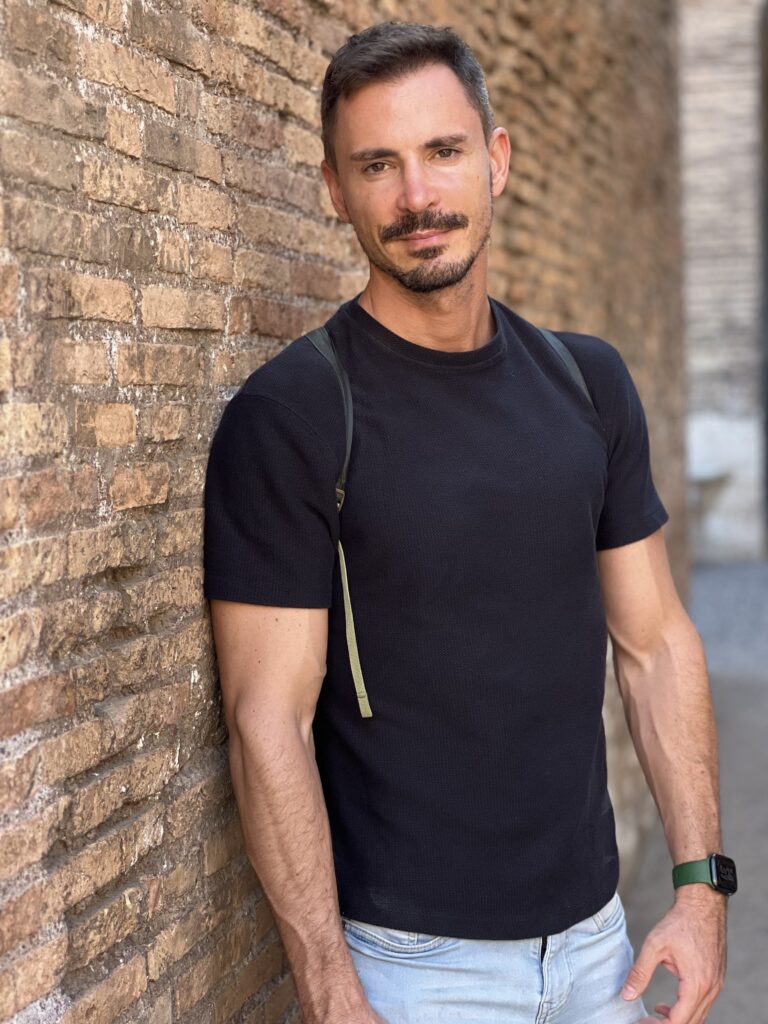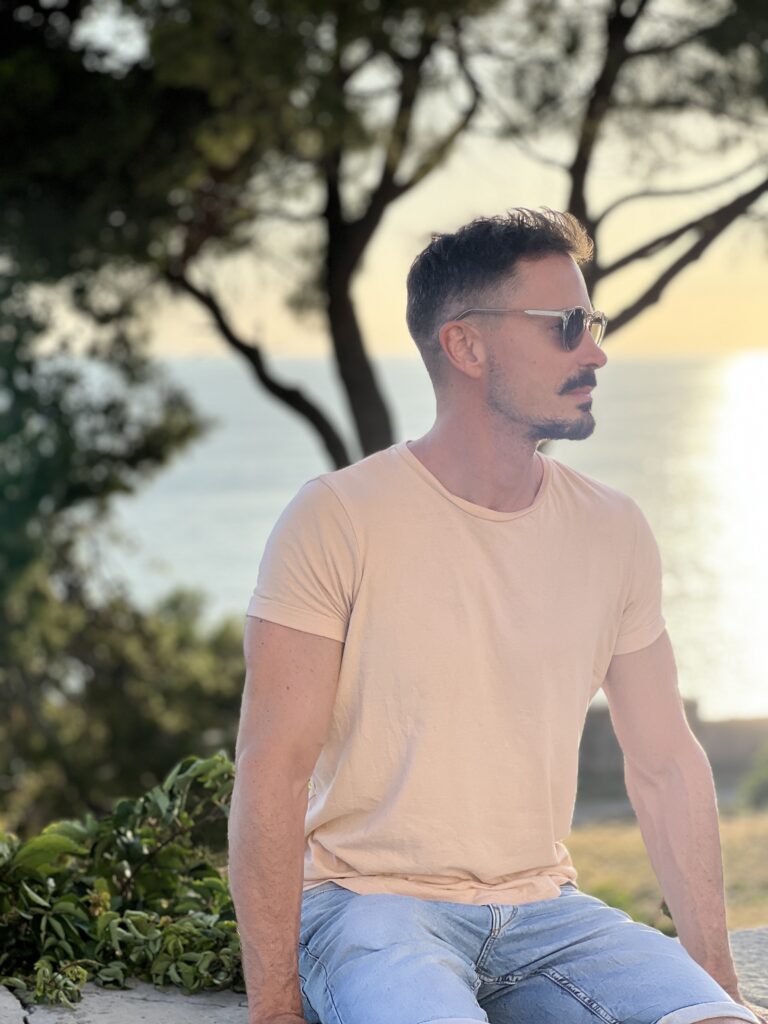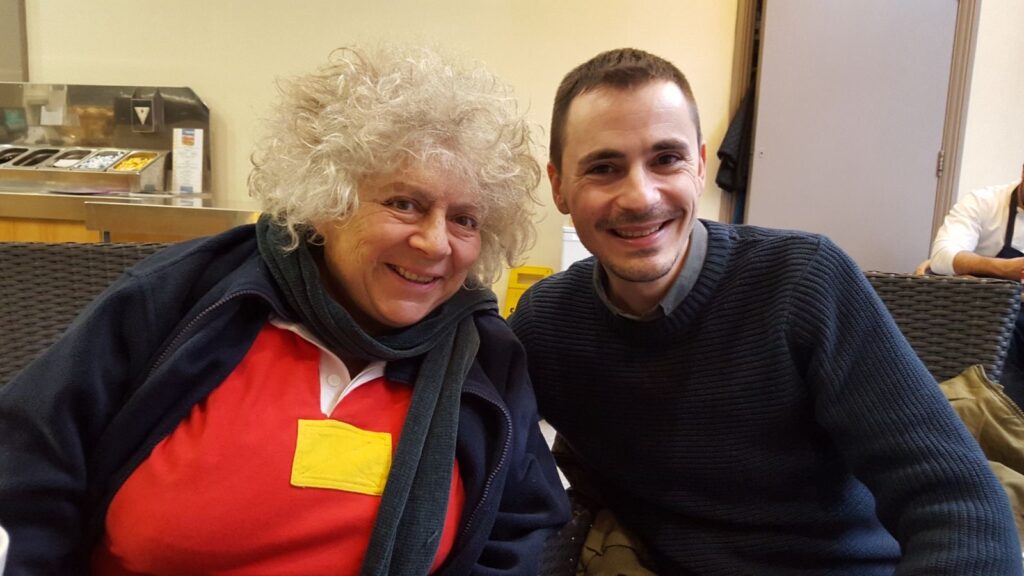Transforming Art Through Passion and Purpose
 Stevan Filipović, a visionary filmmaker, delves into the intersection of art, politics, and society. Known for his innovative approach, he champions authenticity and challenges societal norms through cinema.
Stevan Filipović, a visionary filmmaker, delves into the intersection of art, politics, and society. Known for his innovative approach, he champions authenticity and challenges societal norms through cinema.
Usually, your name is associated with the title “director,” but you are much more than that: an editor, screenwriter, and creator of special effects. How would you describe yourself?
A filmmaker, a cultural worker (laughs). I don’t know; I think all those labels are less important. What matters most is that people do what they love and speak their minds. They should express themselves from a place where they feel they have something to say and contribute to the community. What label that gets is irrelevant. If someone checks Wikipedia, they’ll probably see that I’ve mostly worked as a screenwriter. I graduated in editing and now teach it at the Faculty of Dramatic Arts, but I have chosen to be a director as my life’s vocation.
Critics and experts describe you as a revolutionary in domestic cinema, primarily referring to your introduction of digital technologies and special effects. How did that come about? Did you have that in mind when working on films like Shaitan’s Warrior, Skinning, or Next to Me, or was it simply the result of your search for the proper artistic expression?
That’s an interesting question. I think it’s part of the digital revolution we’re still experiencing, which started in the 1980s and 1990s. I have one foot in the old world and the other in the new world. I grew up in the analogue era and then shaped myself personally and artistically in the digital age. So I remember how things used to be, but I also understand the new ways. At a very young age, I realised this is also a political issue—that digitalisation brings democratisation to our art form.
Cinema was a costly art form. It’s not like a book or a painting that someone can create alone at home. It required the collaboration of hundreds, sometimes thousands of people, to make a film. Film reels and the old chemical processes used for them were very costly. With digitalisation, we’ve reached the point where a mobile phone is practically enough for Soderbergh (Ed. note: Steven Soderbergh, American film director) to make a film (Tangerine) and shoot the entire thing on a mobile phone.
I grew up with Star Wars and The Lord of the Rings. They were very transparent in creating “making-of” documentaries—films about the filmmaking process. We learned a lot from those. When digitalisation arrived, enabling us to work on movies and develop special effects on computers, it coincided with my idea of making a film in the fantasy genre. That’s how Shaitan’s Warrior came to be. We worked on it from 2002/2003, and it premiered in 2006. It was part of the first wave of films shot with digital cameras, and it featured a full range of special effects—from the earliest, traditional ones from the dawn of cinema to the most modern techniques.
In the second-to-last film I worked on (Next to You, the sequel to Next to Me), we included screens, Zoom calls, mobile phones, and conversations between our protagonist and others during the COVID-19 pandemic. Every other shot in that film is a visual effect, but they’re designed to be invisible—unlike in Shaitan’s Warrior, where we had mythical creatures and more obvious effects. Now, it’s become part of the standard toolkit we use when making films, to the extent that it’s an integral part of our everyday lives.
Your films have undoubtedly marked a turning point in domestic cinema. How do you see it today? What would you like to see more of in Serbian films?
“I’d like to see less nepotism, less party-driven allocation of funds, and fewer films made due to money laundering—and more love for cinema. I may be biased because this is my field, but film is the most beautiful syncretic art form to me. It’s a fusion of so many talented individuals, yet directors are unfairly labelled as the sole authors of films. That’s not true. It’s just easier in the media to say – ‘a film by Stevan Filipović.’ Still, a film by Stevan Filipović is equally a film by Maja Radošević, the director of photography, Biljana Tegeltija, the costume designer, and so on. It’s the result of numerous departments filled with incredibly talented people working alongside gifted actors for years to create that artistic work.
Cinema is the most beautiful syncretic art form
I’d love to see that spark of genuine passion and love for the art of film. I’m not sure whether it’s possible to achieve that within the confines of a closed and unfree society. I’m also sceptical about this experiment of trying to produce quality through quantity. That might work on Netflix, but I haven’t seen it succeed in Serbia. I think we’re ‘spinning our wheels,’ and that’s because cinema, like every other aspect of society—from healthcare to architecture—is tied to the nature and fundamental character of our society.
And right now, I believe we’re living in a closed, unfree, and authoritarian society. In this context, it’s tough to work authentically. You won’t get funding. Film is expensive, and we’re tied to these grant systems, making it almost an impossible mission for artists to come out ahead. And I mean ahead regarding mental health, the end product, and that basic existential aspect.”
Your films are socially engaged and reflective on a personal level. Do you think it’s possible to inspire awareness about specific social issues through culture?
“I stick to Brecht’s approach—he defined it simplest and most precisely. Everything personal is political, and all art is political, whether we want it to be. If I make a romantic comedy during a war, that’s also a political decision. In that case, my stance would be: ‘I’m not interested in the war. I’m interested in escapism.’ That’s a legitimate choice, but you can still infer the political stance of an artist who chooses to work on something like that.
Films have a public platform that reaches a large audience, and with that comes the responsibility of addressing the subject matter and the ideas we’re putting forward. Ultimately, we commit ourselves to these projects—they’re like ‘marriages’ that last for years. Films evolve alongside us as artists, and I believe it’s incredibly selfish and irresponsible to be politically disengaged in such a context.
We are witnessing a fundamental societal shift—from a semi-successful, semi-failing democracy to authoritarianism. Yet how many series or films address this? Almost none. And if they do, it’s so veiled that it feels like we’re in North Korea. Well, I refuse to accept those conditions. I refuse to play by those rules, where I have to pretend we’re North Korea, where certain names can’t be mentioned, and everything has to be wrapped up neatly. I’m willing to pay that price. The ultimate price is not working at all. And if that’s the case, I’d instead not work. That’s just not who I am—I don’t tolerate suppression.
This is also why I love Star Wars. It’s epic fantasy, but it’s a profoundly political story. The first trilogy is about Richard Nixon, and the second is about George W. Bush—George Lucas has been quite explicit about this. These are highly auteur-driven films, and I’m unsure if audiences know, but Star Wars are independent films. Lucas fought for complete independence from the Hollywood system to create and say whatever he wanted. That story about the fall of the Republic and its transformation into an Empire—that’s what moved me the most and remains my greatest inspiration. Through fantasy, you can often say more about politics than with a film that directly addresses something like, for example, the fall of the Roman Republic.
These are the two fascinations I carry. I always say that if I had to pick the ideal film that combines them, it would be Pan’s Labyrinth. It’s a story about fascism in Spain—a subject surprisingly underexplored in cinema despite being a pivotal point in European history. The fact that fascism was allowed to triumph there and Franco was tolerated until he died in the 1970s shaped much of what we’re still living with today. But I digress. In Pan’s Labyrinth, you have that story, and on the other hand, you have a little girl, the daughter of a woman involved with a Francoist officer, who tries to escape into a fantasy world. Guillermo del Toro perfectly merged those two elements in that film.
You can see that influence in my work. Shaitan’s Warrior was about staying sane in the 1990s through healthy escapism. Then there’s Skinning, more grounded in realism and addresses societal issues head-on. Next to Me carries nostalgia for teenage years, while Next to You is a more severe exploration of society, media, press freedom, and being a journalist. Now, with my upcoming film, Next to Us, I believe I’ll be concluding my exploration of our society—for now. I’m unsure if I’ll have anything meaningful to add after that film.
 The film Next to Me opened the door to a different narrative in our society regarding LGBT topics. Do you think there has been any progress in the perception of the LGBT community now, nearly a decade after the film’s release?
The film Next to Me opened the door to a different narrative in our society regarding LGBT topics. Do you think there has been any progress in the perception of the LGBT community now, nearly a decade after the film’s release?
Next to Me was a big surprise on many levels. First, it was a small film that emerged from experimental work at the Academy of Arts, where I taught before moving to the Faculty of Dramatic Arts. Mira Karanović, an acting professor, invited me as a director to work with the students. That’s where I first noticed a significant gap between myself as a professor and the new generation—I realised how much I’d aged and that if I were to make a film about teenagers, I couldn’t do it alone. I realised we needed to shape the characters and story together.
One of the stories that was personally important to me was tied to my coming out, first to myself and then to my family. Art can be an excellent catalyst—it’s not a substitute for psychotherapy but can complement it. Through that, I created a space to openly discuss something that has always been a part of our lives. Since the beginning of time, there have been people—and even animals—who are, for lack of a better term (and considering politically correct and incorrect language) gay, meaning they are attracted to the same sex.
We live with this, and different cultures have had different approaches to it. There was acceptance in the ancient world, but later, with the rise of stricter Christianity in the Middle Ages, all aspects of human sexuality—especially those concerning women who became victims of this system—were suppressed. We’re still feeling the echoes of that today.
Jumping to the 21st century, I found it incredible that no single film seriously tackled this topic. We’ve had films that touch on these themes, but gay people are often portrayed as caricatures, as objects of ridicule rather than as real, complex individuals.
You often speak publicly about the issues this society is facing. Do you think you and other public figures from the cultural sphere can impact a society that is not particularly favourable toward culture and freedom of thought?
“I think it’s less about us looking down on people and more about approaching them with honesty, the way Žilnik did when making Marble Ass. He lived with those trans sex workers at Kalemegdan, treated them with human decency, and saw them as equals. I think that’s where true art comes from. I can’t speak from above as an artist, as if I have some higher authority. No, we’re all the same.
I can only speak my truth or share my life experiences and use my platform—which is shrinking as censorship and self-censorship increase—to share those truths. Even if it’s just through social media, I can still communicate what I believe.”
Does society have the strength and capacity to accept you, cultural workers, as authorities?
“I don’t even know what society is anymore. We’ve fallen into a trap—a pattern of society that’s perhaps the most toxic—where the loudest voices on social media are perceived as society itself. As a result, we see society as worse than it is. Perhaps I’m wrong, but I think the algorithm favours the worst.
The people profiting from social media—like Twitter, which has essentially become a cesspool akin to a Nazi meeting hall in 1930s Munich, or Instagram, which promotes body worship and nudity—push us into participating in this superficiality, this de-verbalisation and de-intellectualisation. These platforms amplify the worst, and the entire algorithm is designed so that a handful of people—Jeff Bezos, Mark Zuckerberg, Elon Musk (the worst of them all)—can profit endlessly. And by profit, I don’t mean being ten times wealthier than you, but a billion times wealthier. These individuals, who are now beyond the control of any democratic institution, are the ones telling me what my society is.
Digitalisation brings democratisation to our art form
I’m no longer sure about society, and it’s an easy trap to fall into. Similarly, we can fall into the bubble of like-minded individuals, which is also dangerous. We’ll draw the wrong conclusions if we judge society solely based on social media. We need to make an effort, on an individual level, to engage with people and use these platforms to share what we believe is valuable, important, or truthful. From this, perhaps, we can encourage people to return to some logical ‘factory settings.’
I’m not a doctor—I can’t perform an appendectomy. I can’t read three pages online and assume I’m qualified to debate a doctor who has studied medicine for six years. I might comment, but I can’t substitute their expertise.
The internet, however, has allowed people to undermine entire professions. Everyone is an expert on history now, and history is no longer treated as a science but as a narrative—most often a nationalist one. While this remains the case, it’s difficult to answer your question. We lack the tools to quantify things or understand what society even is. Yes, some individuals thank me for my social engagement. And then there are plenty who don’t care at all. On the other hand, there are TikTokers with a hundred thousand times more followers than I have. So, all my knowledge, skills, qualifications, and teaching experience pale compared to these people’s influence.
This is a demon we need to fight on a global level. Serbia isn’t unique, but here, it’s particularly cancerous because the authoritarian regime uses these networks to mould new generations of voters. The less educated they are, the less they can react to or embrace Enlightenment ideas. The more apolitical or powerless they feel—’We can’t change anything’—the easier they are to control. But we can change things; we can’t if we decide we can’t.”
 You are a strong opponent of lithium mining and other extractive practices in Serbia. Our society is practically at war over this issue. Do you think ordinary people can triumph over big capital and neocolonialism? If so, what do we need to do to achieve it?
You are a strong opponent of lithium mining and other extractive practices in Serbia. Our society is practically at war over this issue. Do you think ordinary people can triumph over big capital and neocolonialism? If so, what do we need to do to achieve it?
It’s essential to build on what I’ve already mentioned. The social model we currently live in is one of absolute domination by the capitalist system. There are, of course, variations on this theme. In China, we have a kind of communist capitalism—an authoritarian state and a completely closed society. Then there’s mafia capitalism, seen primarily in Russia but also Turkey, Hungary, and Serbia. This is what Bálint Magyar described as a “mafia state,” sociologically defining it as a model of authoritarian society. It’s not a society or a state but rather a kind of mafia organisation.
Every personal story is inherently political
We also have the neoliberal model—or, as I’d call it, the metastasis of capitalism—spreading worldwide. What’s most frightening about this form of capitalism is the way its proponents, particularly staunch neoliberals in places like America, dismiss it as being non-ideological. They often say, “You have your ideologies, but this isn’t one.” I think that’s one of the biggest lies they sell.
An ideology is a value system, and capitalism most certainly has one. It boils down to one principle: that money is more important than everything else—more important than the destruction of the planet, human lives, health, or even a minimal sense of civic dignity. Exposing this lie is the first step we need to take. Understanding and dismantling this system of values is crucial if we hope to challenge its dominance and prevent it from dictating every aspect of our lives and environment.
In your latest film, Next to Us, you address many negative social phenomena through the personal stories of young people and their search for identity. Do you think the audience has recognised this?
Next to Us will be released in December 2024, so I hope the story we started with Next to Me in 2015 will finally conclude as a trilogy. The previous film, Next to You, was more of a digression we made during the pandemic. It follows the fate of a journalist working for a pro-regime tabloid who, in a polite way of putting it, personally experiences the consequences of such irresponsible journalism.
In the film, we explore whether ethics can awaken in people who are part of that system—this machinery that prints lies and destroys lives daily. When such people are personally affected by it, could it awaken a sense of morality, even in just one person? Films always serve to explore these kinds of possibilities and even allow us to dream. Think of Quentin Tarantino’s movies and their alternate endings, like killing Hitler in 1942-43. It’s a game, but it’s also a serious experiment. Can dormant ethics be awakened? I always, somewhat naively, think they can.
I refuse to tolerate suppression
Next to You is notable for featuring Miriam Margolyes, a BAFTA-winning British actress who has worked with Martin Scorsese in The Age of Innocence and appeared in Harry Potter. She accepted the role because she loved the character. The film also stars Svetlana Bojković, Bane Trifunović, Mina Nikolić, Darko Ivić, and a series of other fantastic Serbian actors.
This film was rejected five times for the most minimal funding the state should have provided. We have a written response from a commission stating they didn’t think journalism was an important topic in Serbia. In one instance, they refused even to watch the film. This was a grant process where people applied with scripts, and we used them with a completed film. That same film went on to be screened at Oxford and Goldsmiths, won awards at festivals, including the Auteur Film Festival and the Digital Awards, and premiered in cinemas in Serbia, Pula, Sarajevo, and elsewhere. Yet, they deemed it unworthy of even being viewed.
In the end, we received minimal funding through competition for post-production completion, thanks to a commission that had enough integrity to fulfil the obligations mandated by state regulations. But this process is exhausting—it takes years and years.

What are you currently working on that the public is allowed to know about? What can we expect from you soon?
What’s already known because it has been announced is that the film Next to Us concludes the story of the class from the previous films, but it also works as a standalone film. In the first part, the kids are locked inside their school, but they find themselves in the wilderness, left to their own devices, unsure if they’re in a reality show or not. We then see what they’ve become 10 years later, having lived in Serbia. What kind of people are they now? Each story from the first film gets its conclusion, as all the characters’ arcs are resolved, and their fates are more fully developed.
This is the most complex shoot of my life, spanning Bulgaria, Montenegro, Croatia, and Serbia. The locations are incredible, with minimal computer effects: mountain peaks, caves, lakes, and rivers. It’s a full-blooded adventure action film with a strong socio-political backdrop—everything I love packed into one project in a way that hasn’t been done or seen in our region before.